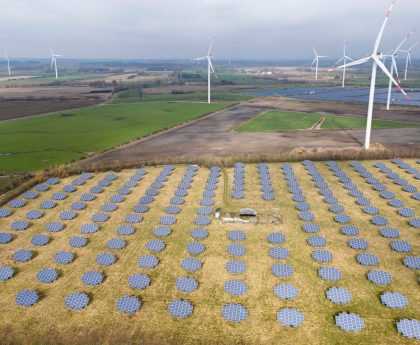Celebrating Earth Day, officials in Cohoes broke ground on a first-in-the-nation municipal-owned Floating Solar Array.
Speaking in front of the reservoir where the panels will float, second-term Democratic Mayor Bill Keeler says the $8 million project could generate 3.2 megawatts of clean energy – which could power nearly 2,500 homes.
Keeler says when finished, the project will eliminate more than $600,000 in yearly electric costs for the Albany County city, saving taxpayer money. Keeler says it’s important to preserve and protect the city’s limited greenspace.
“So, all of our electric bills will go away, and we’ll be making money selling back into the grid,” Keeler said. “It’s a big project.”
Keeler says it adds to existing green initiatives like an expanded recycling program and going totally electric in city-owned buildings.
Housed within Cohoes’ reservoir, Keeler says, the panels in the 10-acre untreated water basin are expected to create more energy output than the city needs. Keeler says there have been talks to sell the excess back into the grid or to the school district at a discount.
The 8,000 panels are expected to be operational early next year.
In 2023, Congressman Paul Tonko, who represents the Capital Region, secured $3 million for the project through the Community Project Funding process. The Democrat says Cohoes can serve as an example for municipalities across the country looking to go green.
“It’s a new spin on solar that again speaks to our opportunity to save 2.1 million hectares of land and to maybe reach a goal of 10 percent of our electricity needs, which is a huge contribution,” Tonko said. “It also reduces algae blooms and evaporation because of the coverage that it provides. So, there are built in benefits, savings that come with this, along with the direct savings on energy costs.”
The state Department of Environmental Conservation encourages municipalities to use preexisting infrastructure to their advantage. Sean Mahar is interim commissioner:
“We’re here to help navigate that process and there are site specific considerations on each project that’s going to be individual in nature and that’s what our experts help communities assess and as soon as you get in the door, the quicker we can get started on the process,” Mahar said.
Other funding for the project includes $750,000 through National Grid’s Renewable Energy Economic Development Grant Program. The funding will also provide Troy’s Rensselaer Polytechnic Institute with resources to create an interactive reservoir map to find potential host sites for similar projects. More than $960,000 is being provided through the NYSun Incentives program through the state’s Energy Research and Development Authority and $2.7 million through the Inflation Reduction Act.
This post was originally published on 3rd party site mentioned in the title of this site




